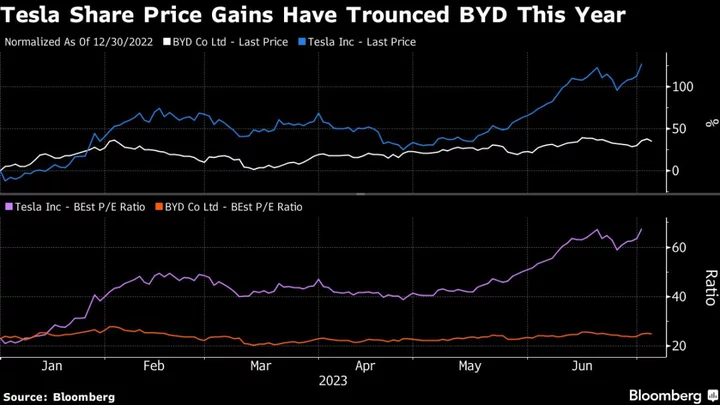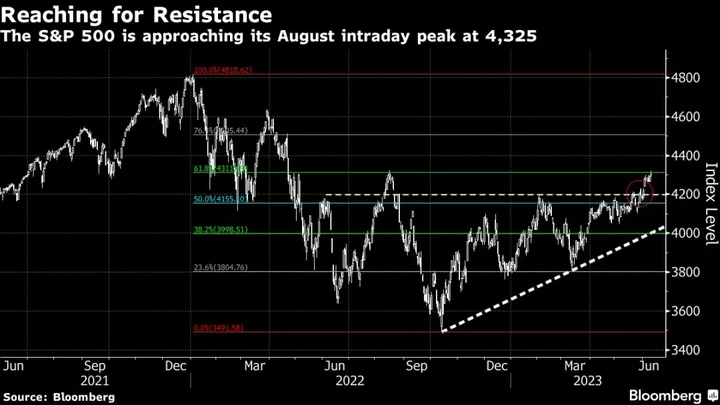Traders trying to push Japanese shares back up to three-decade highs face increasing obstacles — including selling by global funds that helped fuel this year’s gains.
That’s the view of strategists who also see an increasingly unpopular prime minister unable to push through bold measures, and risks of fallout from China’s economic slowdown as factors likely to get in the way of Japanese stocks heading even higher.
The Topix index has retreated about 2% after hitting the highest since 1990 on Aug. 1. The question is whether the market will regain the bullishness that saw the benchmark rise for the seventh straight months in July, the longest streak since April 2013. The rally was spurred by signs that inflation is taking hold in Japan while companies are increasingly seeking to boost shareholder returns, pushed by the Tokyo Stock Exchange to do so.
Profit-Taking by Foreign Investors
Foreign investors, who had helped drive one of the world’s biggest rallies so far this year, may pose risks for Japan’s stock market in the second half. Overseas funds might take profits to pocket unrealized gains from the share market rally since April, said Tomo Kinoshita, global market strategist at Invesco Asset Management.
The pace of market-friendly reform is also seen by some to be slow. Only a handful of companies have mentioned in their corporate governance reports their cost of capital, which would give investors a better picture of their financial health, or details on steps they’re taking to raise their stock price, said Masatoshi Kikuchi, chief equity strategist at Mizuho Securities Co. The TSE’s push to reduce shares that trade at prices below their book value also falls short of foreign investors’ expectations for more ambitious goals, he said.
Foreign investors sold a net 257 billion yen ($1.8 billion) of Japanese shares and futures in the week to July 28, after purchasing a net 9.49 trillion yen in the April-June period, a record amount for a quarter, Ministry of Finance data compiled by Bloomberg show.
Kishida Loses Support
Prime Minister Fumio Kishida’s public support is languishing, dragged down partly by problems with new national ID cards. That may make it difficult for him to push ahead with reform steps such as measures to increase job mobility, seen by analysts as needed to boost corporate productivity and return on equity.
But it may be politically unpopular because of prospects that more workers may lose their jobs. In a poll by public broadcaster NHK in July, disapproval of his administration rose to 41% while supporters dropped to 38%.
Kishida likely won’t take risky measures with his support weakening, but that may prompt share sales by foreign investors disappointed by the lack of new steps, said Shinichi Ichikawa, a senior fellow at Pictet Asset Management. The prime minister said in a London speech last year that his government will “actively support” job mobility.
China’s Economy
China accounts for about 16% of revenue at companies traded in Tokyo, according to data compiled by Bloomberg using market-cap weighted averages, and only including firms that report sales breakdowns from the country. Companies including Fanuc Corp. and Murata Manufacturing Co. have relatively high exposure to China, making their shares more sensitive to signs of any economic deceleration.
Citigroup Inc.’s Economic Surprise Index shows that China’s data have been worse than market expectations since May. The nation’s manufacturing purchasing managers’ index for July exceeded analyst forecasts for a fourth straight month but remained below the 50 line, indicating contraction in economic activity.
Hong Kong and Chinese stocks have rebounded on expectations Beijing will try to jumpstart economic growth with stimulus measures, but “if the policies are disappointing, there’s a risk that Japanese stocks will weaken,” dragged down by declines in the two markets’ equities, said Yasuhiko Hirakawa, head of investment management department Ⅱ at Rakuten Asset Management Inc.
--With assistance from Masaki Kondo.









